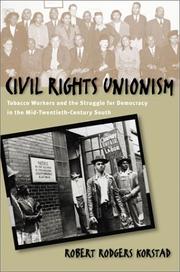| Listing 1 - 4 of 4 |
Sort by
|

ISBN: 0807854549 0807827819 0807862525 9780807862520 9780807827819 9780807854549 9798890875518 Year: 2003 Publisher: Chapel Hill : University of North Carolina Press,
Abstract | Keywords | Export | Availability | Bookmark
 Loading...
Loading...Choose an application
- Reference Manager
- EndNote
- RefWorks (Direct export to RefWorks)
Drawing on interviews with black and white tobacco workers in Winston-Salem, North Carolina, Korstad explores their confrontations against racial capitalism that consigned African Americans to the basest jobs in the industry, perpetuated low wages for all southerners and shored up white supremacy.
Civil rights movements. --- Tobacco workers. --- Business. --- Tobacco workers --- Civil rights movements --- Business & Economics --- Labor & Workers' Economics --- History --- Labor unions --- Food, Tobacco, Agricultural, and Allied Workers Union of America --- FTA --- Food, Tobacco, and Agricultural Workers of America --- Tobacco industry --- Employees --- United Cannery, Agricultural, Packing, and Allied Workers of America --- Distributive, Processing, and Office Workers of America --- history --- E-books
Book
ISBN: 1620970430 9781620970430 Year: 2014 Publisher: New York : New Press, The,
Abstract | Keywords | Export | Availability | Bookmark
 Loading...
Loading...Choose an application
- Reference Manager
- EndNote
- RefWorks (Direct export to RefWorks)
Praised as ?viscerally powerful" (Publishers Weekly), this remarkable work of oral history captures the searing experience of the Jim Crow years?enriched by memories of individual, family, and community triumphs and tragedies. In vivid, compelling accounts, men and women from all walks of life tell how their day-to-day lives were subjected to profound and unrelenting racial oppression. At the same time, Remembering Jim Crow is a testament to how black Southerners fought back against the system?raising children, building churches and schools, running businesses, and struggling for respect in a
Book
ISBN: 1469603675 0807895741 9780807895740 9781469603674 9780807833797 0807833797 9780807871140 0807871141 9798893131505 Year: 2010 Publisher: Chapel Hill : University of North Carolina Press,
Abstract | Keywords | Export | Availability | Bookmark
 Loading...
Loading...Choose an application
- Reference Manager
- EndNote
- RefWorks (Direct export to RefWorks)
When Governor Terry Sanford established the North Carolina Fund in 1963, he saw it as a way to provide a better life for the ""tens of thousands whose family income is so low that daily subsistence is always in doubt."" Illustrated with evocative photographs by Billy Barnes, To Right These Wrongs offers a lively account of this pioneering effort in America's War on Poverty. Robert Korstad and James Leloudis describe how the Fund's initial successes grew out of its reliance on private philanthropy and federal dollars and its commitment to the democratic mobilization of the poor.
Economic assistance, Domestic --- Poverty --- History. --- Government policy --- North Carolina Fund
Digital

ISBN: 9783110969467 9783598414763 Year: 2013 Publisher: Berlin ;; Boston K. G. Saur
Abstract | Keywords | Export | Availability | Bookmark
 Loading...
Loading...Choose an application
- Reference Manager
- EndNote
- RefWorks (Direct export to RefWorks)
| Listing 1 - 4 of 4 |
Sort by
|

 Search
Search Feedback
Feedback About UniCat
About UniCat  Help
Help News
News